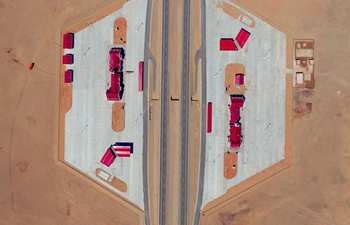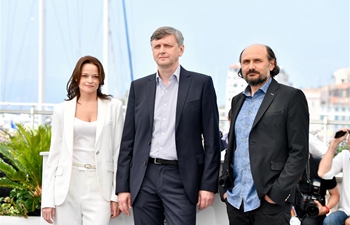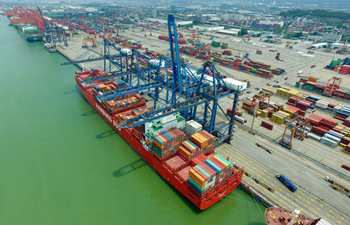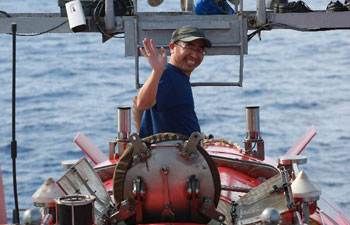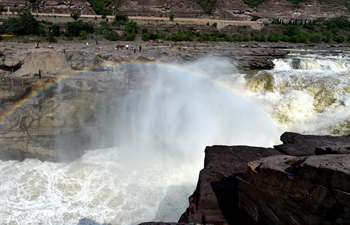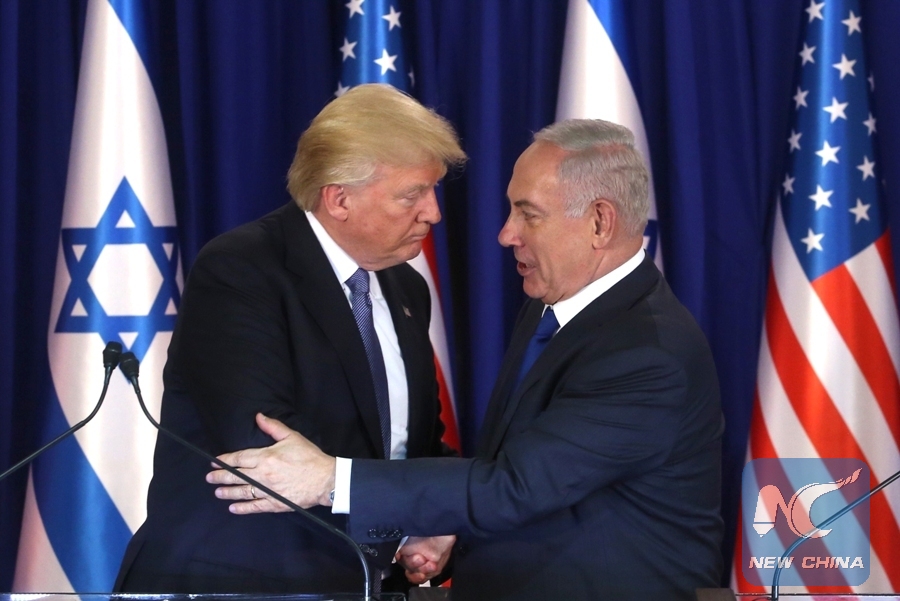
U.S. President Donald Trump (L) meets with Israeli Prime Minister Benjamin Netanyahu in Jerusalem, on May 22, 2017. Speaking on the first day of his visit to Israel and the West Bank, U.S. President Donald Trump urged Israeli Prime Minister Benjamin Netanyahu to start a "new partnership" with the Arab world. (Xinhua/JINI/POOL/Marc Israel Sellem)
by Liu Wanli, Keren Setton
BEIJING, May 25 (Xinhua) -- U.S. President Donald Trump presented a reversed Middle East policy during his maiden overseas trip to Saudi Arabia and Israel, by calling for an anti-Iran coalition, which may fuel the tension in the region and jeopardize efforts for reconciliation.
The Obama administration sought to establish a delicate balance of power in the Middle East by pulling out troops from Iraq, pressuring Israel on settlement issues, holding up military support for Saudi Arabia and signing a nuclear deal with Iran, a series of moves distanced its traditional allies and are obviously abandoned by Trump.
However, days of a meet-and-greet trip cannot resolve decades-long conflicts between Israel and the Arab world, nor deter Iran by trying to form a coalition that is more likely in theory.
People in the region who are struggling in terrorism and wars need reconciliation much more than division and hatred.
BRIDGE GAP BETWEEN ALLIES
Trump is the only American president who makes a Muslim majority nation and Israel his first overseas trip, which indicates his policy of forming a new Middle East coalition by easing conflicts between Israel and the Arab world so as to rally against Iran's influence in Syria, Yemen, Iraq and Lebanon.
He announced a 110-billion-U.S.-dollar arms deal with Saudi Arabia upon his arrival, including precision weaponry that his predecessor Barack Obama had held up over concerns of civilian casualties in the war in Yemen.
In his final remarks in Jerusalem, Trump said there are "new opportunity" for nations in the region to end sectarian strife and find peace.
"I call upon people to draw inspiration from this ancient to set aside out sectarian difference to overcome oppression and hatred," he said, adding that a prerequisite for a regional coalition would be to recognize Israel's positive contribution "to the region and the world."
He also expressed optimism about the Israeli-Palestinian peace process after meeting with Palestinian President Mahmoud Abbas in the West Bank city of Bethlehem. "They are ready for peace," he said.
"Trump inherited a relatively stable Middle East - as opposed to the upheaval and developments during Obama's time," said Dr. Ronen Zeidel, an expert on the Middle East Affairs from the University of Haifa.
"Trump came to Israel to reassure Netanyahu of his support. He came to calm traditional Israeli fears...It strengthens their sense of security and that is why they welcomed him so nicely in Saudi Arabia," he added.
"There is no way this visit will jumpstart the peace process and in no way will lead to normalization between Israel and the Arab world," Ronen said.
"Trump manages to reinvigorate the regional coalition and rally the pragmatic Sunni world two days after the elections in Tehran," said Ron Prosor, Israel's former envoy to the United Nations.
"Israel's homework is to look and see the coinciding interests with Sunnis that were not there for many years," he added.
COALITION AGAINST IRAN
"Trump presents a reversed Obama doctrine - he says he comes to do the opposite," said Yaki Dayan, a former Israeli consul general in Los Angeles, adding that "the only thing in common with Obama is that they view the Israeli-Palestinian conflict as a major issue but they have two completely different methods of solving it."
Trump is looking to create an Arab NATO, he added.
During his visit to Jerusalem, Trump said a struggle against Iran and the Islamic State (IS) should be a shared interest of all nations in the Middle East.
U.S. Secretary of State Rex Tillerson also called on Iranian President Hassan Rouhani who was reelected last week to "dismantle the network of terrorism."
In response, Rouhani said Washington should drop its "hostile" policy.
The United States has no other way but to think of a "win-win approach vis-a-vis Iran, otherwise, they will fail," Rouhani said.
"He created a new axis of evil - Hamas, IS, Iran and Hezbollah," Ron Prosor said.
The U.S. army invaded Iraq in 2003 and toppled then Iraqi President Saddam Hussein, which completely destroyed the country's political system.
Politicians, militia, and religious leaders, supported by the United States and regional countries, struggled for power at the expense of security and stability in the country.
The al-Qaida group established its Iraqi branch in 2009, taking the advantage of power vacuum, and later gave birth to the Islamic State which occupied large swaths of territories in Iraq and neighboring Syria, and launched terrorist attacks across the world.
The last thing the region needed was more weapons, critics said, referring to Trump's trip.
"He is not here to educate, no values, just interests," Yaki Dayan said.
"The big question is not whether the visit was symbolic rather than substantial but whether it will have long term affects. This depends on how much Trump is determined - right now it looks like he means business," he said.
As millions of civilians are suffering from political struggle for years in the Middle East, reconciliation efforts are more in need than confrontation than ever.





